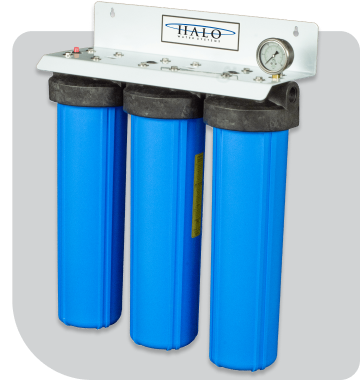Contact Us For HALO
Water Filtration System Installation
When it comes to ensuring clean and safe water for your home, we are your trusted partner. Our expertise in HALO systems combined with our commitment to customer satisfaction, makes us the top choice for your water filtration needs.
If you’re unsure which HALO water filtration system is the right fit for your home, our knowledgeable team is here to help. We’ll take the time to assess your specific requirements, whether you’re interested in the comprehensive whole-house filtration provided by the Halo 5 system, the compact convenience of the Halo H2 ZERO, or the countertop solution offered by the HALO Mini 3, we’ll guide you towards the best choice for your needs.
To get started, simply call us and our friendly staff will be happy to answer any questions you may have and provide you with expert guidance. Don’t compromise on the quality of your water. Take the first step towards clean, refreshing water by reaching out to us today.
Your HALO Water Filtration Questions Answered
Have questions about HALO water filtration systems? We’ve got the answers! Explore these frequently asked questions to gain insights into the effectiveness, functionality, and benefits of Halo water filtration systems.
The effectiveness of a HALO system depends on various factors, including the specific water quality, contaminants present, and the filtration needs of your household. HALO offers a range of water filtration systems, each designed to address different requirements. The most effective system for you will depend on factors such as the level of filtration required, the size of your home, and your specific water concerns. It is recommended to consult with a professional from ACW Service Inc who can assess your water quality and guide you toward the most suitable and effective Halo water filtration system for your needs.
The effectiveness of a water filter in removing contaminants depends on several factors, including the specific contaminants present in the water and the filtration technology used. Different water filters are designed to target specific types of contaminants. For example, activated carbon filters are effective in removing chlorine, volatile organic compounds (VOCs), and some chemicals. Reverse osmosis systems are known for their ability to remove a wide range of contaminants, including heavy metals, bacteria, viruses, and dissolved solids. However, the specific filter that removes the most contaminants will vary depending on the water quality and the contaminants of concern. It is advisable to consult with a water treatment professional who can analyze your water quality and recommend the most suitable filter to effectively address the specific contaminants you want to remove.
Yes, whole-house water filters are designed to provide comprehensive filtration for all the water entering your home. These systems are installed at the main water supply line, ensuring that every faucet, shower, and appliance receives filtered water. Whole house water filters are effective in removing a wide range of contaminants, including sediment, chlorine, chemicals, heavy metals, and other impurities. They work by utilizing various filtration technologies, such as activated carbon, sediment filters, and sometimes additional stages like UV sterilization or reverse osmosis, depending on the specific system. The effectiveness of a whole-house water filter will depend on factors such as the quality of the filter, the flow rate, and the specific contaminants present in your water. It is advisable to consult with a water treatment professional like ACW Service Inc to determine the best whole-house water filtration system for your specific needs and ensure optimal performance.
The best filtration method for drinking water depends on the specific contaminants you want to remove and your preferences for water quality. There are several effective filtration methods commonly used for drinking water. Some popular options include activated carbon filters, reverse osmosis systems, and UV (ultraviolet) disinfection.
- Activated carbon filters: These filters use activated carbon to adsorb and remove impurities, including chlorine, volatile organic compounds (VOCs), and certain chemicals. They are known for improving taste and odor.
- Reverse osmosis (RO) systems: RO systems are highly effective in removing a wide range of contaminants, including dissolved solids, heavy metals, bacteria, viruses, and certain chemicals. They use a semipermeable membrane to separate impurities from the water.
- UV disinfection: UV disinfection systems use ultraviolet light to inactivate or destroy bacteria, viruses, and other microorganisms in the water. They are often used in combination with other filtration methods to ensure comprehensive water treatment.
The best filtration method for your drinking water will depend on your specific water quality concerns and preferences. Consulting with a water treatment professional, such as ACW Service Inc., can help determine the most suitable filtration method based on your needs and provide recommendations for achieving clean and safe drinking water.
Filtering municipal water can help improve its quality by removing potential contaminants and enhancing taste and odor. The best way to filter municipal water depends on your specific water quality concerns and filtration goals. Here are a few effective methods commonly used:
- Whole House Water Filtration: Installing a whole house water filtration system ensures that all water entering your home is filtered, providing comprehensive treatment for all faucets and appliances. This can include a combination of sediment filters, activated carbon filters, and other technologies tailored to address the specific contaminants found in your municipal water supply.
- Point-of-Entry (POE) Filtration: POE filtration systems are installed at the point where water enters your home, such as the main water line. These systems typically employ multiple stages of filtration, including sediment filters, activated carbon filters, and other media, to address a wide range of contaminants present in municipal water.
- Point-of-Use (POU) Filtration: Point-of-use filtration involves installing filters at specific outlets, such as kitchen faucets or showerheads. Common types of POU filters include activated carbon filters, reverse osmosis systems, and under-sink filters. These systems provide targeted filtration for drinking water and specific areas where you desire improved water quality.
Filtering municipal water is a personal choice that depends on various factors, including the quality of your local water supply and your specific concerns about contaminants. While municipal water treatment facilities aim to provide safe and clean drinking water, there are instances where additional filtration may be desired. Here are a few reasons why people choose to filter their municipal water:
- Improved Taste and Odor: Municipal water may sometimes have a chlorine taste or unpleasant odor. Filtration systems, such as activated carbon filters, can help remove these taste and odor compounds, resulting in more enjoyable drinking water.
- Additional Contaminant Removal: Municipal water treatment plants typically comply with regulatory standards to remove common contaminants. However, there may still be trace amounts of certain substances, such as heavy metals, pesticides, or pharmaceutical residues. Filtration systems, like activated carbon or reverse osmosis, can provide an extra layer of protection by reducing these contaminants.
- Individual Sensitivities: Some individuals may have specific sensitivities or health concerns that lead them to opt for filtered water. For example, people with compromised immune systems or certain medical conditions may prefer the added assurance of filtered water.
- Peace of Mind: Filtering municipal water can provide peace of mind, knowing that you have taken an extra step to ensure the quality and safety of your drinking water.



